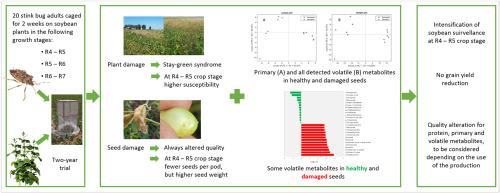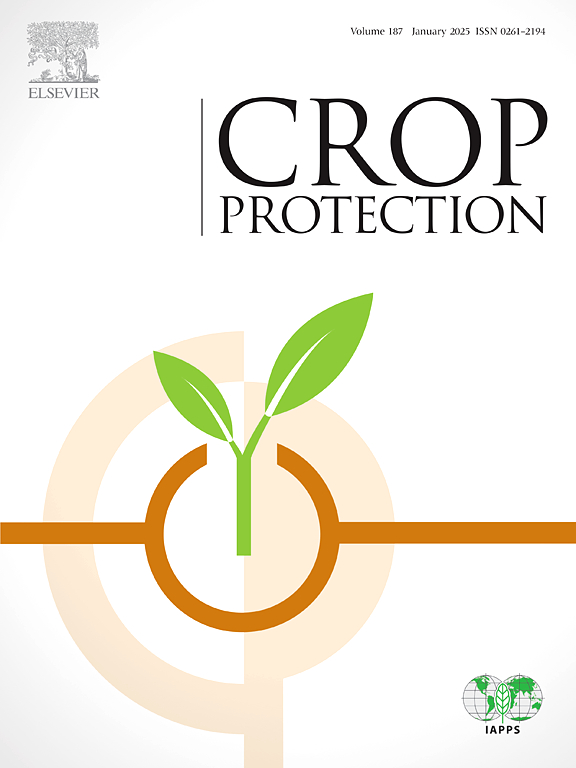Halyomorpha halys(半翅目:五蠹科)在不同生长阶段对大豆作物造成的定量和定性危害
IF 2.5
2区 农林科学
Q1 AGRONOMY
引用次数: 0
摘要
褐马蝽 Halyomorpha halys 是一种原产于东亚的入侵物种,目前在欧洲各地的大豆上大量出现,并已成为危害作物的主要害虫。由于更好地了解哈雷蝽的影响对于实施有效和可持续的害虫管理至关重要,本研究旨在评估大豆在哪些阶段最容易受到哈雷蝽的攻击,以及哈雷蝽取食大豆种子所引起的质和量的变化。因此,大豆植株在不同的发育阶段都会受到蝽成虫为期两周的危害,并在收获时对危害情况进行检查。在大豆的 R4-R5 发育阶段,褐飞虱的危害最为严重。在同一时期,蚜虫的取食活动大大降低了每荚种子的数量,这表明 R4-R5 阶段的危害率较高,此时应加强对大豆的监测,以便采取适当的虫害防治策略。由于植物补偿机制的作用,每荚种子数减少导致种子重量增加,因此谷物产量与受害时间或受害种子率没有差异。不过,虽然哈雷虫的侵袭不会造成总体产量损失,但却会对大豆种子造成质量损害,特别是通过改变蛋白质含量和调动贮藏大分子中的几种初级代谢物,这一点必须根据生产的预期用途加以考虑。本文章由计算机程序翻译,如有差异,请以英文原文为准。

Quantitative and qualitative damage caused by Halyomorpha halys (Hemiptera: Pentatomidae) on soybean crop at different growth stages
The brown marmorated stink bug Halyomorpha halys, an invasive species native to East Asia, is now present and abundant on soybean throughout Europe where it has become a major pest damaging the crop. Because a better understanding of the impact of H. halys is crucial to implement effective and sustainable pest management, the present study aimed to assess the stages at which soybean is most susceptible to H. halys attacks, and the qualitative and quantitative alterations caused by its feeding on soybean seeds. Therefore, soybean plants were exposed to stink bug adults for 2 weeks at different development stages and were examined at harvest for damage. Stay-green syndrome occurred most severely as a result of H. halys attacks at soybean development stages R4-R5. In the same period, the bug feeding activity significantly reduced the number of seeds per pod, thus indicating a higher damage rate at the R4-R5 stage when soybean surveillance should be intensified in order to properly target pest management strategies. The lower number of seeds per pod corresponded to an increase in the seed weight due to plant compensation mechanisms, leading to grain yields that did not differ in relation to the time of attack or the rate of damaged seeds. However, while not causing overall a loss of weight production, H. halys attacks were shown to cause qualitative damage to soybean seeds, especially by altering protein content and mobilizing several primary metabolites from storage macromolecules, which will have to be considered depending on the intended use of the production.
求助全文
通过发布文献求助,成功后即可免费获取论文全文。
去求助
来源期刊

Crop Protection
农林科学-农艺学
CiteScore
6.10
自引率
3.60%
发文量
200
审稿时长
29 days
期刊介绍:
The Editors of Crop Protection especially welcome papers describing an interdisciplinary approach showing how different control strategies can be integrated into practical pest management programs, covering high and low input agricultural systems worldwide. Crop Protection particularly emphasizes the practical aspects of control in the field and for protected crops, and includes work which may lead in the near future to more effective control. The journal does not duplicate the many existing excellent biological science journals, which deal mainly with the more fundamental aspects of plant pathology, applied zoology and weed science. Crop Protection covers all practical aspects of pest, disease and weed control, including the following topics:
-Abiotic damage-
Agronomic control methods-
Assessment of pest and disease damage-
Molecular methods for the detection and assessment of pests and diseases-
Biological control-
Biorational pesticides-
Control of animal pests of world crops-
Control of diseases of crop plants caused by microorganisms-
Control of weeds and integrated management-
Economic considerations-
Effects of plant growth regulators-
Environmental benefits of reduced pesticide use-
Environmental effects of pesticides-
Epidemiology of pests and diseases in relation to control-
GM Crops, and genetic engineering applications-
Importance and control of postharvest crop losses-
Integrated control-
Interrelationships and compatibility among different control strategies-
Invasive species as they relate to implications for crop protection-
Pesticide application methods-
Pest management-
Phytobiomes for pest and disease control-
Resistance management-
Sampling and monitoring schemes for diseases, nematodes, pests and weeds.
 求助内容:
求助内容: 应助结果提醒方式:
应助结果提醒方式:


